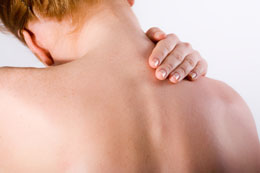Muscle knots in neck are extremely bothersome, as the neck movements get affected. This article carries a brief overview of this condition, and possible options to get rid of it.

The scientific name given to muscle knots, in general, is myofascial trigger points. It can be described as a condition where spots of tight or tensed muscles are formed. They can form in almost any part of the body, like back, neck, hips, etc. You can get knots in the neck all of a sudden while sleeping, or when you are trying to reach out to a high shelf. These give rise to a sharp pain which tends to aggravate when one tries to move the neck.
How do Knots Form in the Neck?
When we move our body for normal activities, different groups of muscles of the neck and back work in a cycle. In other words, none of them work constantly. They are continuously changing from active to passive mode, in cycles. When any of these muscles sustain injury, spasms occur, giving rise to a tight feel in the neck, which may or may not be accompanied by pain. This condition compels the injured muscles to stay active round the clock. As a result, the muscle is unable to relax. If this abnormal state lasts for some time, the affected muscle gets overloaded, and knots are formed. This can be triggered by a number of factors. Injury due to trauma is one of the causes. Besides, certain physical activities like lifting of heavy objects can lead to knots in the side of the neck. Sometimes, dietary habits, underlying health disorders, or psychological condition of the patient can also be responsible.
Treating Knots in the Neck
Some effective treatments for such muscle aches are as follows:
Application of Heat: This will have a soothing and relaxing effect on the taut muscles, which in turn will help in loosening up of the knots. You can use electric heating pads, heated gel packs, or heat-producing disposable pads, for this purpose. However, heat should not be applied if there is swelling in the area.
Massage Therapy: Deep tissue massage of the neck muscles, done by a good masseuse, can ease off the knots due to pressure being applied to the source of pain repeatedly. During the massage, patients may experience a lot of pain in the knot, but later on, they will feel much better.
Medicines: When the pain caused by knots formed in the neck and shoulder muscles becomes too much, non-steroidal, anti-inflammatory medicines and muscle relaxers are often prescribed by doctors. Sometimes, injections are administered directly into the muscle knots. Muscle pain creams can be applied to the neck to relieve the pain temporarily. To yield maximum benefits, use such creams just before going for a massage. This will relax the muscles, and maximizes the effectiveness of the massage.
Other Treatments: Electrical stimulation and ultrasound treatments have been proved to be highly beneficial in many cases. Some gentle stretching and physical therapy exercises, when done under the supervision of a therapist, can prevent the muscle from getting constricted further. Acupuncture is an alternative form of treatment to cure muscle knots in the neck area.
Good, nourishing food, that is rich in calcium and magnesium, aids in faster recovery from knots. It is also important to drink plenty of water and keep yourself hydrated, as dehydration can worsen the muscle spasms. Stay as active as possible, and do not stiffen up your neck. This will make removal of knots all the more difficult.
Disclaimer: This Buzzle article is solely for informative purpose and not intended to replace the advice of medical experts.


 The scientific name given to muscle knots, in general, is myofascial trigger points. It can be described as a condition where spots of tight or tensed muscles are formed. They can form in almost any part of the body, like back, neck, hips, etc. You can get knots in the neck all of a sudden while sleeping, or when you are trying to reach out to a high shelf. These give rise to a sharp pain which tends to aggravate when one tries to move the neck.
The scientific name given to muscle knots, in general, is myofascial trigger points. It can be described as a condition where spots of tight or tensed muscles are formed. They can form in almost any part of the body, like back, neck, hips, etc. You can get knots in the neck all of a sudden while sleeping, or when you are trying to reach out to a high shelf. These give rise to a sharp pain which tends to aggravate when one tries to move the neck.